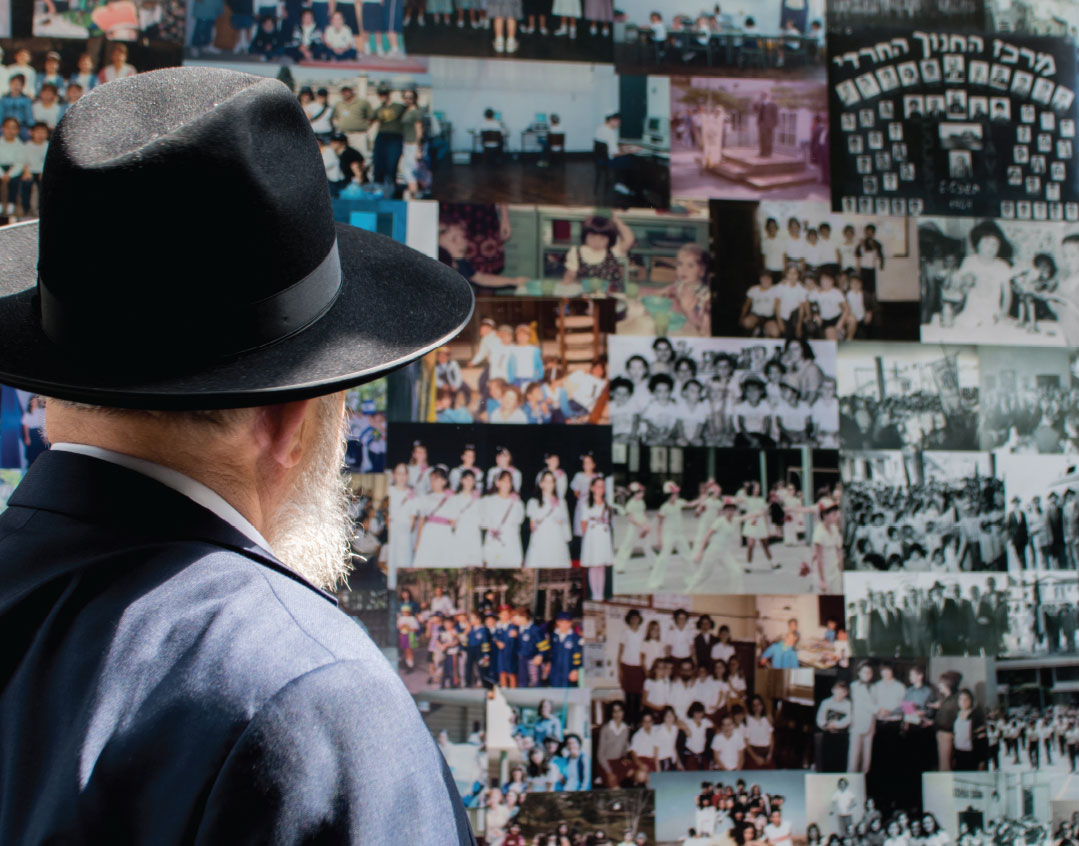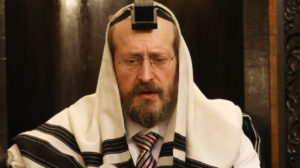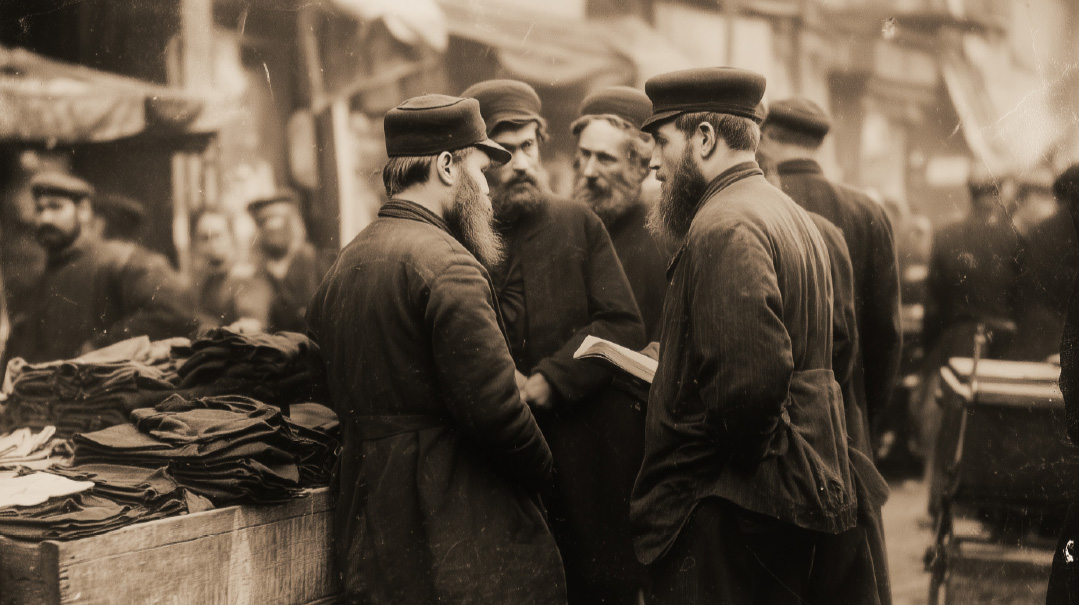Southern Hospitality

Half a century after he and his wife served as Torah teachers in the Brazilian city of Sao Paulo, Mishpacha’s Rabbi Moshe Grylak awakens memories of life under a brutal military dictatorship — and learns once again how history comes full circle

T
he recent visit of Brazilian President Jair Bolsonaro to Israel brought back some dormant memories of our own sojourn in this South American country over 50 years ago. Bolsonaro, who came a week before Israeli elections to show solidarity with Israel and with Bibi Netanyahu, is a right-wing firebrand who, during his own election campaign last year, had made controversial statements playing down the brutality of the country’s past military dictatorship. While the media was speculating on whether he’d make good on his promise to move the Brazilian embassy to Jerusalem, I was thinking about that very dictatorship that caused such divisive headlines in his county. In fact, I’m quite familiar with that dictatorship, as it ruled the country when my family and I were sent there by Israel.
Back in 1964, before the idea of such a shlichus had even entered our minds, a relative named Rav Shlomo Shapiro visited my parents’ home. He was a Torah scholar and a prominent resident of the Sao Paulo, Brazil, Jewish community. I was at my parents’ house at the time and I heard him relating that he was cutting short his visit to Israel and hurrying home because a military coup had taken place and the army, headed by Marshal Humberto de Alencar Castelo Branco, had taken power.
I remember how strange it sounded to me at the time that he was rushing back home, right into the lion’s den. The news was full of reports that the army was making mass arrests of all those who opposed the military, and that all civil rights in the country had been suspended. And my father’s relative was returning home, seemingly unconcerned.
But two years later, my wife and I and three small children found ourselves on the way to that very same country, as emissaries of the Jewish Agency to teach Jewish subjects in a religious school called Beit Chinuch. It wasn’t an easy decision. Who flew to such distant places voluntarily back in the 1960s? And Brazil? We’d heard rumors of military brutality, and indeed, our family in Israel was not much in favor of our adventure.
Still, we went. The clincher for our decision was the fact that my wife’s brother, a well-connected lawyer named Mottel Landau lived there (as a young war survivor, Mottel went to work with Vaad Hatzalah activist Dr. Yaakov Griffel saving children from monasteries), so we felt that the acclimation would be easier. The one who really pushed us to go, despite the family’s objection, was my wife’s uncle, the Ozherover Rebbe ztz”l, Rav Moshe Yechiel Epstein, author of Eish Dos and chairman of the Moetezes Gedolei HaTorah of Agudas Yisrael. He encouraged us to set out on the journey, saying that had he been younger, he would also travel abroad to try to stem the tide of assimilation. He saw our journey as a mission for chinuch, a mission for Klal Yisrael.
Under the Radar
We landed in Sao Paulo, Brazil’s largest city, in August 1966. True, we were in the throes of a dictatorship, and one could feel the chokehold in the general atmosphere of the country. It was prohibited to express any criticism of the regime, and there was a definite feeling of dread walking past the armed guards standing outside government offices or other public buildings. I remember walking in the center of the city together with a group of five friends from Israel, when suddenly, the soldiers guarding one of the public buildings came over and demanded that we disperse. Apparently five people walking together was considered an illegal gathering, and thus a demonstration against the regime.
Once, when we accompanied a member of our group to the airport for his return home, we saw pictures posted by the sadistic secret police of wanted activists who were being hunted down because of their political views. Out of curiosity, one of the members of our group pointed to one of the pictures, and although to us it was just a random action, the police thought otherwise. That night I received a frantic phone call from this friend. He said that the military police had appeared in his home and interrogated him about his interest in that fellow in the picture. They wanted to know what he knew about him, if he had ever worked with him, and if he had met him recently. It was frightening.
Even during regular day-to-day life we felt the harsh hand of the regime. We, as Israeli emissaries, had clear instructions on how to conduct ourselves. We were never to leave our homes without our passports and without our Brazilian certificates permitting us temporary residency. We had to learn the phone numbers of the Jewish Agency officials by heart — they were our direct employers. We also needed to know the phone number of the Portuguese principal of the school where we worked. That’s because you could never know what would happen — a sudden unexplained arrest or the like. And therefore it was imperative to stay in contact and know who to turn to in the event that something happened. Although our lives weren’t actually threatened or made uncomfortable, there was always a cloud hanging over us.
We once traveled for a family visit to Santiago, Chile, a free nation in the southern part of the continent. When we returned to our home in Brazil after a month, we felt a certain constriction, although it was hard to put our finger on it. It was that feeling of living under a military regime and knowing your every step was being monitored. At the same time, in contrast to the dictatorships of the Communist left, where the person is subjugated to the regime in all aspects of life, this fascist-right wing dictatorship did not intervene in your personal life or your finances. In general, as long as you were not involved in politics, you could remain under the radar. But if they had the slightest suspicion that you were a leftist, they pursued you relentlessly.
That’s why I considered one particular local friend especially brave. One evening, this friend, who concealed his association as a leftist, came over to my house and said “I need to show you something.” He drove along a city street which bordered on the walls of one of the well-known military prisons. At a certain point we slowed down and he said to me, “Listen.” I did as he instructed, but didn’t hear anything. Then he told me that sometimes, when it was quiet on the street and you passed by the prison you could hear the screams of the people being tortured under interrogation by the secret police, notorious for their sadism.
Another anecdote: The rav of the city, Rabbi Shneur David Walt, with whom we became very friendly, invited us for a Shabbos meal. He explained that he was hosting a certain personality in his home and he would feel more comfortable if we would also be his guests. Of course, we didn’t refuse. When we arrived we met a husky Brazilian gentile who radiated authority, accompanied by an aide — or bodyguard? This Brazilian, whose identity I had not yet figured out, was quite expressive of his opinions about Jews and Judaism, and questioned me persistently about who I was and what I was doing in Brazil.
I had been briefed ahead of time not to say that I was here on a mission from the Zionist state to teach Hebrew, because the nationalist dictatorship forbade any other nationalist identity besides Brazilian. They weren’t, however, against religion per se. Therefore, when I was asked by the guest what I was doing in Brazil I replied that I was here to teach the Jewish religion. He liked this answer. “Yes, teaching religion is very important,” he said.
Eventually I figured out that he was some kind of officer in the new regime, and after he ate Jewish cholent at the Rav’s table and left, the Rav told me that he was an officer in the Brazilian navy and an interrogator for the military government. The Rav had invited him in order to try to soften an interrogation that he was conducting against a Jew who had been arrested for smuggling electronic devices into the country.
Later, when I told my brother-in-law that I had cholent with Captain Nemo, he recoiled in horror: “Do you know who that is?!” he asked in shock. “He’s one of the government’s most brutal and merciless interrogators. Just mentioning his name is enough to cause people to quake in fear.” Indeed, I had not known, and baruch Hashem, it was the closest personal contact I had with the military cult that ruled the country.
Cashed In
In Beit Chinuch where my wife and I taught, daily life settled into a routine. Although it was called an Orthodox school, the level of observance of most of the students was very low. The parent body was for the most part not Torah-observant, and many conflicts arose between us teachers from Eretz Yisrael and the parents.
For example, although studies were held on Chol Hamoed Pesach by order of the government, we had to fight that at least the children should not bring their standard bread sandwiches to school. Slowly though, the students began absorbing Jewish concepts and became a bit connected to the world of mitzvos. We had an especially hard time with the girls in the high school, trying to convince them against assimilating — and we weren’t always successful on this front.
But we settled in, did our best, and learned the sub-language of the country at the same time: It was called bribery. We couldn’t believe how life was built entirely on bribery. It was rampant — everyone bribed everyone.
Here are a few examples: I actually learned to drive in Brazil. Before the tests — the practical and the written — the teacher explained to me that if I didn’t pay — meaning if I didn’t bribe the tester — I wouldn’t pass the test. “You’re a foreigner here,” Miguel, the driving teacher, explained. “They will fail you until you understand that you need to pay them.”
At first I didn’t even consider heeding his advice and sullying myself with bribery. But as the day of the test drew nearer, I had this sinking suspicion that I’d fail because I hadn’t provided the testers with the bribe they expected. Having no choice, and repulsed as I was, I capitulated. I called Miguel and told him I was ready to pay.
Miguel and I set out at night to the homes of each of the testers to pay them the “test fee.” The next day, I passed the test, of course. Any mistakes I made were forgiven on the spot. Things got most interesting when it came to the written test: Hundreds of people sat in a large hall, and each of us got test pages with multiple choice questions. The paper with my name on it had a special marking, and the head examiner wasn’t even embarrassed to tell me to sit quietly and not write anything. Soon the proctor would come in and tell me what to write.
And so, I sat quietly in my place until the proctor arrived to make sure we weren’t copying from each other. He came over and asked me why I wasn’t writing. I told him I was thinking about what to write. He leaned over and whispered to me, “Here write this, and here write that.” I did as he said, noticing how he similarly “helped” a large number of the people.
I discovered how deeply ingrained in the system it was when I needed to be hospitalized for some minor surgery. My wife was afraid I wouldn’t be treated well if we didn’t bribe the nurses. From the start she was advised to bribe every nurse who entered the room so that I should get quality treatment. A nurse entered and my wife gave her a bill, to which she asked, with feigned surprise, “Why are you giving this to me?” My wife replied, “It’s because you’ve been so helpful.” In no time, the nurses realized that the potential of riches lay in the room of the foreign patient, and there was literally a pilgrimage to my bedside.
Every few minutes the door opened and another nurse entered. One came to clean the sink, the other to remove the dust from the window. As each one got her gift from my wife, they all put on a poker face as if they had no idea what it was all about.
Once I was the beneficiary of a bribe and didn’t even know it. It was a year after the Six Day War, and the school paid my ticket for a flight back to Israel, where I could touch the Kosel and travel the suddenly expanded land. Once the return flight landed in Sao Paulo, there was a long line snaking from the passport desks, the tired passengers surrounded by police officers and soldiers in typical fashion of a state shackled by military regime.
Suddenly I heard an announcement: “Senior Grylaki, please go over to the police desk.” I tensed: What did they want from me? I hastened past the other travelers to the head of the long line, where a police officer awaited me. “Passport please,” he asked. My tension mounted, and of course I handed over the passport. He glanced at it, leafed through the pages for a second, and quickly signed it and directed me past customs, where my suitcase was waiting. I was out! My nephew, a lawyer, was waiting for me and greeted me happily.
“How did I get you out of that endless line of passengers?” he asked.
“How, indeed?”
“I went over to the police officer and said to him, ‘My uncle who came from Paris is very tired…’ The officer replied, ‘All the passengers are tired…’ ‘That’s right, but he’s bringing me a tape recorder and I don’t want the customs to notice it.’ The officer kept a straight, serious face and took me through customs…”
In the evening, the police officers called my nephew: “I notice that according to your name you are Jewish. Where do you Jews buy good shirts?”
My nephew got the hint and bought the officer a set of good shirts.
Spies among Us
There was another undercover aspect of life in the Brazil of those days, when the world stood in awe of Israeli intelligence and the Mossad’s international intrigue. We Israeli emissaries would regularly meet at the Israel Culture House, where we saw other Israelis who sometimes showed up and sometimes disappeared. Mysterious types, they were. It was pretty obvious to us that they were Mossad agents, but when we asked them who they were representing, they’d answer that they were agronomists, brought in as experts for growing lettuce.
We understood not to ask any more questions. Those were the years when Brazil served as a Nazi haven — I remember when they arrested the commander of the Treblinka camp, who was living just two blocks away from my house. The police commander even told my brother-in-law that he had captured Mengele, and that he was given $20,000 to release him. My brother-in-law Reb Mottel was aghast.
“What would you have done?” the commander snapped at my brother-in-law. “You wouldn’t have released him for a nice sum of money? The war is over, isn’t it?”
One day I saw three members of that mysterious Israeli group huddling with my brother-in-law in his office. After they disappeared my brother-in-law said to me, “Let’s go to the airport.”
At the airport, Reb Mottel spoke with a police commander he knew. After they drank a cup of coffee together and had a friendly conversation, the commander gave him what he was asking for: a list of incoming travelers from several countries in Europe. There was a group of Palestinians who were suspected of coming to Brazil on behalf of a terrorist organization in an effort to assassinate the Israeli foreign minister, Abba Eban, who was visiting at the time. The Mossad wanted to get the passenger rosters for that day, and my brother-in-law got them in exchange for a small payment to a police commander who didn’t really know what he needed them for.
My brother-in-law didn’t ask the agents why they needed the lists and who they had identified on them. Those were the rules. But months later, he asked them casually what had happened. They smiled as if to say, “Those terrorists won’t ever bother us again.”‘
One time, we even pretended to be the Mossad. After Adolf Eichmann’s capture in 1961, the very name “Mossad” evoked awe, especially in South America. One time Rabbi Walt asked us to join him for a trip to Curitiba, a city in the south of the country, about a six-hour drive from Sao Paolo. He had to arrange a get there as a proxy of the husband from Sao Paolo and he wanted me and another shaliach to be the witnesses. We willing joined him, driving through massive expanses of the country. We got to the city and the get was duly arranged.
Then the Rav took out a letter that he had received from the Israel police asking to locate a certain Israeli man — we’ll call him Yahalomi — who had left his wife an agunah. To the best of their knowledge he was living in this city.
The Rav asked us to help him out. It was a strange request, to try and find an absconded Israeli without an address in a city with millions of residents. My friend, however, wasn’t fazed by the mission, and asked the small crowd that had gathered as we issued the get if they knew a person named Yahalomi.
One of the men there said he did know him, so we asked him to take us to where he lived. The man hesitated, explaining that the man had a crazy temper and was violent, but my friend kept up the pressure until the man finally relented. In the end, he went with us, most reluctantly, to Yahalomi’s home. We knocked at the door and it was opened by a gentile woman who claimed that her husband was not home. We went back out to the street where we saw a man approaching. I can’t explain why, but I whispered to my friend, ‘I have a feeling that this is the Mr. Yahalomi we are looking for.”
Without missing a beat, my friend turned around and shouted, “Mr. Yahalomi!”
The man instinctively turned his head and said, “Yes?”
My friend went over to him, pushed him against the wall, and said, “Hello Mr. Yahalomi. I’m from the Mossad. I have an extradition request from the Israeli Police. The request is already in the Brazilian foreign ministry for your deportation. But if you come with us right now to the rabbi waiting with us to arrange a get for your wife, you’ll spare yourself a lot of unpleasantness.”
The man was truly frightened — he had no idea how the famed Israeli Mossad had gotten to him. Although he was a violent person, he obediently accompanied us to where the Rav was staying and the get was arranged.
In the Shadows
The history of Brazil is intertwined with the anusim of Portugal, and many of the Catholic gentiles in the country are indeed descended from Marrano Jews. It’s known that family names that are of animals were those derogatory names given to Jews who were forced to renounce their religion. Every so often, we too saw hints that shed light about the hidden connection many people had to some forgotten Jewish tradition or practice, blurred over the generations. It was fascinating, because although we often felt like we were in a spiritual desert, we were in fact living in the shadow of our own past.
My brother-in-law told me he was once sitting with two police commanders. One complained that his wife was suffering from insomnia. The second commander remarked that his family had a kamea, an amulet, that had been passed down for generations and it was very helpful in such cases. He brought him… a mezuzah. In another incident, a young priest discovered that the cross passed down in the family from generation to generation is actually a mezuzah. One Brazilian gentile, a neighbor, told me about seeking three stars in the sky on Saturday night before he turned on a light, without knowing why he did this.
We spent four years in Brazil, living under a canopy of military rule, but also under the veil of our own history. In the last half century, the Jewish community there has flourished, Brazil has become a constitutional republic based on representative democracy, and it’s current president is infatuated with the Jewish state. So if we, as little cogs in the wheel of history, were able to contribute something during our years of shlichus and to have been part of a chain of something even bigger, then it’s not only been our reward, but our merit.
(Originally featured in Mishpacha, Issue 762)
Oops! We could not locate your form.













